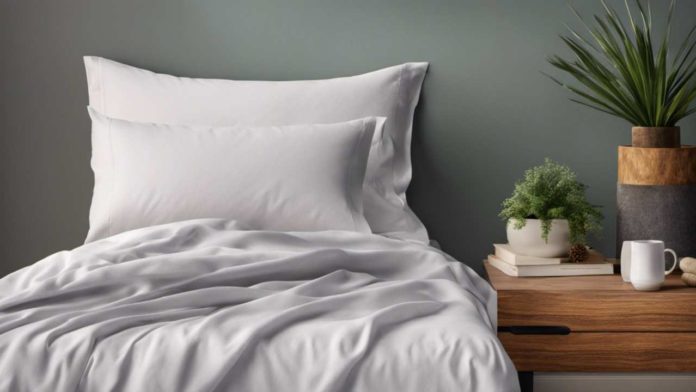Is Microfiber a Good Choice for Sheets?
When it comes to choosing the perfect sheets for your bed, there are a plethora of options available in the market. One such option that has gained popularity in recent years is microfiber sheets. Microfiber is a synthetic material made from ultra-fine fibers, typically composed of polyester or a blend of polyester and polyamide. These sheets are known for their softness, durability, and affordability. However, there are also some drawbacks to consider. In this article, we will delve into the pros and cons of microfiber sheets to help you decide if they are the right choice for you.
The Pros of Microfiber Sheets
Microfiber sheets offer several advantages that make them a popular choice among consumers. Here are some of the key benefits:
1. Soft and Comfortable
One of the main reasons why people opt for microfiber sheets is their incredible softness. The ultra-fine fibers used in microfiber sheets create a smooth and luxurious feel against the skin. This makes them incredibly comfortable to sleep on, providing a cozy and relaxing experience.
2. Wrinkle-Resistant
Microfiber sheets are known for their wrinkle-resistant properties. Unlike natural fibers like cotton, microfiber sheets are less prone to wrinkling, which means you can enjoy a neat and tidy bed without the hassle of ironing.
3. Easy to Care For
Another advantage of microfiber sheets is their low-maintenance nature. They are machine washable and dry quickly, making them convenient for busy individuals. Additionally, microfiber sheets are resistant to fading, so you can enjoy their vibrant colors for a long time.
4. Hypoallergenic
If you suffer from allergies or have sensitive skin, microfiber sheets can be a great choice. The tightly woven fibers of microfiber sheets create a barrier against dust mites, pollen, and other allergens, helping to reduce allergic reactions and skin irritations.
The Cons of Microfiber Sheets
While microfiber sheets offer many advantages, there are also some downsides to consider before making a purchase. Here are a few drawbacks:
1. Lack of Breathability
One of the main criticisms of microfiber sheets is their lack of breathability. Microfiber is a synthetic material that does not allow air to circulate as well as natural fibers like cotton. This can result in a warmer sleeping environment, which may not be ideal for those who tend to sleep hot.
2. Less Durable
Compared to natural fibers, microfiber sheets are generally less durable. Over time, the ultra-fine fibers can start to break down, resulting in pilling and a decrease in overall quality. However, with proper care, microfiber sheets can still last for a reasonable amount of time.
3. Static Build-Up
Microfiber sheets are prone to static build-up, especially during dry winter months. This can lead to uncomfortable shocks and clinginess. However, using a fabric softener or dryer sheets can help reduce static electricity.
Is Microfiber a Good Choice for You?
Now that we have explored the pros and cons of microfiber sheets, it’s time to determine if they are a good choice for you. If you prioritize softness, affordability, and low maintenance, microfiber sheets can be an excellent option. They are particularly suitable for individuals with allergies or sensitive skin due to their hypoallergenic properties. However, if breathability and long-term durability are important factors for you, you may want to consider other options such as cotton or linen sheets.
Ultimately, the choice of sheets depends on personal preference and individual needs. It’s always a good idea to consider factors like climate, sleeping habits, and budget before making a decision.
Editor’s Opinion
As an editor, I believe that microfiber sheets can be a great choice for those seeking comfort and affordability. They offer a soft and luxurious feel, making them perfect for a good night’s sleep. Additionally, their wrinkle-resistant and easy-to-care-for nature make them a convenient option for busy individuals. However, it’s important to note that microfiber sheets may not be the best choice for those who prioritize breathability and long-term durability.
Frequently Asked Questions (FAQs)
Q1: Are microfiber sheets as soft as cotton sheets?
A1: Microfiber sheets are known for their softness and can be just as soft, if not softer, than cotton sheets.
Q2: Can microfiber sheets cause allergies?
A2: Microfiber sheets are hypoallergenic and can help reduce allergic reactions as they create a barrier against dust mites and allergens.
Q3: Do microfiber sheets shrink after washing?
A3: Microfiber sheets are generally resistant to shrinking, but it’s always recommended to follow the care instructions provided by the manufacturer.
Q4: Can microfiber sheets be used in hot climates?
A4: Microfiber sheets are less breathable compared to natural fibers like cotton, so they may not be the best choice for hot climates or individuals who sleep hot.
Q5: How long do microfiber sheets typically last?
A5: With proper care, microfiber sheets can last for several years. However, they may not be as durable as natural fibers like cotton or linen.
Sources:
- https://www.thespruce.com/microfiber-bed-sheets-4174600
- https://www.sleepadvisor.org/microfiber-sheets-pros-cons/
- https://www.sleepfoundation.org/best-sheets/microfiber
- https://www.thespruce.com/microfiber-bed-sheets-4174600


